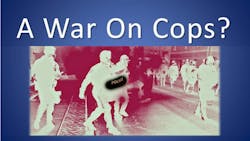As I write this article, the latest pronouncement from Washington is that the President is banning an array of military-style equipment from landing in the hands of police departments. The prohibited equipment includes grenade launchers and certain armored vehicles, which a panel examining the Ferguson riots concluded were controversial and likely to incite people to become violent. That’s surprising to me since the cops merely watched (orders from on high) as more than 150 businesses and 200 vehicles were set on fire. No action was taken to provoke these “concerned” community types. And in fact, violent gangs joined forces and fought the police, rather than each other. Not surprisingly, Baltimore has seen 96 homicides this year–an undercurrent of violence that’s up almost one-third from this time last year. Not much in the news on that statistic.
The President’s ill-advised decision regarding equipment that aids law enforcement comes at a time when there appears to be a war on cops—from both supposed friends as well as foes. A recent article in the Daily Caller indicated, “the anti-police climate is taking its toll on the men and women in uniform and that morale is low in departments across the country.” I’d have to agree. As I talk with our brothers and sisters in blue, a sense of impending doom seems to be the prevalent attitude. One deputy told me his proactive patrolling is on hold. “I’m driving with blinders on,” he said, “only making traffic stops for the most serious violations.”
Add into the mix the violence witnessed in the Ferguson and Baltimore riots, where police were told to stand down, and it makes for a complete lack of trust and confidence in leadership. More importantly, cops are fearful they’ll face legal and political ramifications if they get caught sideways in a situation. The Baltimore 6 imbroglio has sent an icy chill over morale and vigor of cops across the country. Baltimore officers made a good faith arrest and were then taken to task by the mayor and other city and state authorities. Baltimore police were called racists, despite the fact that more than half the department is comprised of minorities.
Cops in Baltimore are worried. The Baltimore Sun quoted one cop thusly, "In 29 years, I've gone through some bad times, but I've never seen it this bad," said Lt. Kenneth Butler, president of the Vanguard Justice Society, a group for black Baltimore police officers. “Officers feel as though the state's attorney will hang them out to dry." To say cops are dejected is putting it mildly. Butler went on to say, “I’m hearing it from guys who were go-getters, who would go out and get the guns and the bad guys and drugs. They’re hands-off now. I’ve never seen so many dejected faces.”
Although legal experts disagree with the State”s Attorney’s judgment that the arrest of Freddie Gray was wrong, that sentiment offers little solace to cops on the street. They fear they can be falsely accused and subsequently charged with a crime just for doing their job. A former federal prosecutor suggested the remedy for failing to establish proper probable cause is that “a defendant goes free—not that an officer goes to jail.”
Getting back to the issue of cops and military equipment, it seems this wrong-headed move to prevent giving military gear to law enforcement is prompted more by optics than pragmatism. In Ferguson, the media focused on police in riot gear wearing camouflage and using armored vehicles. My question to the panel and to the President is this: What equipment do you suggest in place of these items? After all, this is a riot . . . a civil disturbance perpetrated by hundreds of lawbreakers. Helmets and shields protect against rocks and bottles, while armored vehicles are least susceptible to being overturned and set on fire. Grenade launchers allow us to introduce gas into a multi-story structure, or from a safe distance into a gathering crowd. We don’t throw or launch grenades, Mr. President.
Only those of us who have been involved in these types of events can attest to the fact that more equipment is needed—not less. And the coup de grace, of course, is not only are cops faced with losing protective gear, but they’re also ordered to stand down and watch while people assault citizens, steal property, and commit acts of arson and damage to property, or any other violation they can get away with.
As the days and weeks pass, certainly tempers are decidedly cooler and tension at a lower rate. However, the fear remains that cops will be disciplined whenever someone raises the specter of race or police brutality—whether that charge has merit or not. The mere suggestion that police are acting on the basis or a person’s skin color is the ultimate trump card. It’s a no-win situation for officers. Moreover, it may cause good cops to wonder: Do I continue to police my beat as I’ve always done, or do I only do what’s absolutely required?
The future of policing is at a critical point. Perhaps there is a war against cops.
Stay Safe, Brothers and Sisters!
About the Author
John Wills
John M. Wills is a former Chicago police officer and retired FBI agent. He is a freelance writer and award-winning author in a variety of genres, including novels, short stories and poetry. John also writes book reviews for the New York Journal of Books, and is a member of the National Book Critics Circle. His new book, The Year Without Christmas, is available now. Visit John at: www.johnmwills.com.

